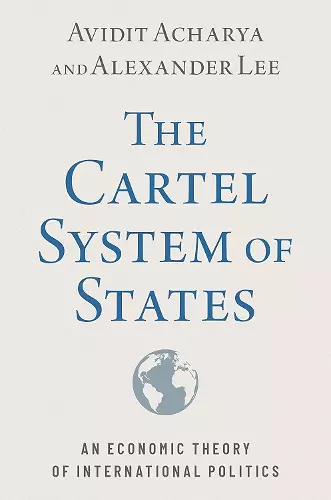The Cartel System of States
An Economic Theory of International Politics
Alexander Lee author Avidit Acharya author
Format:Hardback
Publisher:Oxford University Press Inc
Published:8th Dec '22
Currently unavailable, and unfortunately no date known when it will be back
This hardback is available in another edition too:
- Paperback£20.99(9780197632277)

The people who live in border towns often have closer relations with people across their immediate borders than with people in the same country as them. Despite how intertwined these border communities often are, neither community can access the governmental institutions of the nation on the other side. Why are the citizens of neighboring regions that lie across an international border often subject to very different governance systems? More broadly, why can't public services be bought piecemeal, on an a-la-carte basis, with governments competing to provide higher quality services at the lowest cost in a marketplace for government services? These questions lie at the heart of modern International Relations. In The Cartel System of States, Avidit Acharya and Alexander Lee provide a powerful and field-shaping theory to address a fundamental issue in world politics: the character of the territorial nation-state. They contend that the modern territorial state system works as an economic cartel in which states have local, bounded monopolies in governing their citizens. States refuse to violate each other's monopolies, even when they could do so easily. Acharya and Lee examine what makes this system stable, when and how it emerged, how it spread, how it has been challenged, and what led it to be so resilient over time. Drawing from the centuries long process of modern state formation, The Cartel System of States explains both how the present system of territorial states--by no means a foregone conclusion in retrospect--took over the world and how it might change in the future.
In The Cartel System of States, Acharya and Lee analyze rulers as monopoly providers of governance services to citizens, who collude with rulers of other countries to restrict competition and protect their local monopolies. They use their theory to interpret the rise of the modern state system, and to analyze the challenges it faces in the current international political and economic environment. The Cartel System of States presents a striking and systematic argument and evidence that will be of interest to all scholars of international politics. * Jeffry Frieden, Harvard University *
In this ambitious analysis, Acharya and Lee deploy the tools of political economy to explain the stability and form of the modern state system. In their model, states are collusive arrangements, in which rulers divide territory among themselves to maximize the benefits of ruling. The authors reveal the surprising sources of cartel stability and draw out the implications of their theory for the study of territorial conflict, nationalism, and international institutions. The result is insightful and deeply provocative. * Melissa Lee, University of Pennsylvania *
This provocative book provides a novel perspective on the international state system and its operation. It maintains that governments across the globe and over time have created and perpetuated a cartel to monopolize the governance of their citizens. Cartel theory implies a revised history of the international state system and opens up new ideas for how that system has changed and might change in the future. * Helen V. Milner, Princeton University *
Why is the world organized into countries with mutually recognized boundaries? Acharya and Lee's book presents a pathbreaking new answer based on the idea that potential rulers compete in a market to govern citizens and that the territorial state system that structures world politics reflects cooperation among rulers to avoid competition and extract as much as possible from citizens. This amazing book establishes this idea as a powerful lens for understanding how globalization, nationalism, state failure, and international institutions have and will shape cooperation and conflict within and between states. The book is a fantastic achievement and a must read for anyone interested in international relations. * Kenneth Scheve, Yale University *
A wholly original and illuminating perspective on the delineation and maintenance of nation-state boundaries. Starting from beguilingly simple premises of the need for governance and the logic of the cartel, Acharya and Lee clarify the logic behind much of the history of international relations. The insights it affords are likely to be the port of departure for much subsequent work. * James Scott, Yale University *
ISBN: 9780197632260
Dimensions: 235mm x 156mm x 18mm
Weight: 508g
222 pages